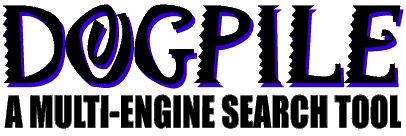Anatomy of a page
Evaluating for relevance
Authority of a Web page
Evaluating for accuracy
Page types:
Informational pages
News sources
Advocacy web pages
Personal home pages
Web search strategies:
Getting started
Web directories
Search engines 1
Search engines 2
Citing online sources
Glossary
Search Engines 2
Suggested general search engines
Follow links for more information:
Follow links to go directly to these sites:
- Evaluated sites: Magellan and Lycos' The Point are two companies that search for "the best" sites on the web. Search results include reviews. Examine their criteria carefully.
- HotBot can search for graphics, sounds, movies, etc.
- MathSearch will search for pages on college level mathematics.
- MetaCrawler can be customized to search for pages from a particular geographical region.
- Government sites are cataloged in GovBot.
- Look for e-mail and house addresses with Four 11, People Finder, and SavySearch.
- Galaxy can search for resources available with telnet and gopher.
- DejaNews searches USENET news group postings.
- Liszt is an index of Internet mailing lists.
- Reference.COM can search for mailing lists, news postings, and Web forums.
- Download.com searches for shareware.
- Beaucoup offers a page that can search major newspapers and magazines.
Features: Infoseek is smart, easy to use, and forgiving; thus it is a good search engine for newbies, and a good place to start any search. Infoseek can search for Web pages, USENET postings, news stories, phone numbers, addresses, and e-mail addresses. Infoseek also has a Web directory of rated sites. Here are some of Infoseek's unique features and quirks:
Read Infoseek's help file for more information.
Features:
Multi-search: Dogpile is a multi-search engine. Instead of searching its own database, Dogpile will search twenty-five different commercial search databases, including Yahoo!, Lycos, HotBot, Excite, and others, and present the results on the same results page. These features can save you an enormous amount of time for simple searches.
Meta-search: Dogpile also has Metafind, a program that will search several databases at once and create a single list of all of the results. See the Metafind Help page for more details.
Operators: You can use any of the possible operators with a query. Arfie, the "fetch" software, will translate them into the appropriate format for each of the databases it checks.
Why search anywhere else? The first reason is that Dogpile only gives the top 10 results from each search engine. Metafind also has limits on the number of hits it will present. Secondly, all of the search engines have their own unique features to help you find information. In some cases, it is easier to go directly to the source to customize a search than to send the query through Dogpile. Finally, Dogpile is designed for users who are searching for as much information about a topic as possible. Researchers looking for a particular page, or some fairly common information, would have better luck using a single search engine.
AltaVista is known for its breadth and speed. It is among those search engines that catalog whole pages, so a query may hit information in the title, description, or content of the pages.
Features:
Simple Search: Simple Search just accepts keywords, phrases (""), and includes and excludes (+/-).
Advanced Search: Selecting Advanced Search brings up a unique search form that offers the following features:
Read AltaVista's help file.
URL for this Document: http://www.slu.edu/departments/english/research/page9.html
Phrase searching yes: "" or - (hyphen)
Includes/Excludes yes: + only
Boolean logic no
Meta-search no
Web directory yes
Phrase searching yes: ""
Includes/Excludes yes: +/-
Boolean logic yes: AND OR NOT NEAR
Meta-search yes
Web directory no
Phrase searching yes: ""
Includes/Excludes yes: + or -
Boolean logic yes (Advanced Search): AND OR NOT NEAR
Meta-search no
Web directory no
Version 1.1
© 1997 Craig Branham
BRANHACC@SLU.EDU
Saint Louis University
Created: 27-Sept-97
Last Modified: 06-Oct-97


